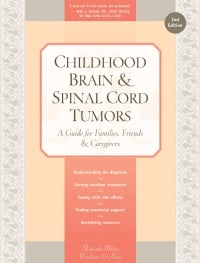Childhood Brain and Spinal Cord Tumors
Physical responses
Many parents become physically ill in the weeks following diagnosis. This is not surprising, given that most parents stop eating or grab only fast food, have trouble sleeping, and are exposed to all sorts of illness while staying in the hospital. Every waking moment is filled with excruciating emotional stress, which makes the physical stress much more potent.
Our daughter had many strong seizures while in the hospital, and my stomach would churn. I’d have to leave the bedside when the nurse would come to help. I had almost uncontrollable diarrhea. Every new stressful event just dissolved my gut; I could feel it happening.
To try to prevent illness, it is helpful to try to eat nutritious meals, get a break from your child’s bedside to take a walk outdoors, and find time to sleep. Care needs to be taken not to overuse drugs or alcohol in an attempt to control anxiety or cope with grief. Although physical illnesses usually end or improve after a period of adjustment, emotional stress often continues throughout treatment.
Table of Contents
All Guides- Introduction
- 1. Diagnosis
- 2. The Brain and Spinal Cord
- 3. Types of Tumors
- 4. Telling Your Child and Others
- 5. Choosing a Treatment
- 6. Coping with Procedures
- 7. Forming a Partnership with the Treatment Team
- 8. Hospitalization
- 9. Venous Catheters
- 10. Surgery
- 11. Chemotherapy
- 12. Common Side Effects of Chemotherapy
- 13. Radiation Therapy
- 14. Peripheral Blood Stem Cell Transplantation
- 15. Siblings
- 16. Family and Friends
- 17. Communication and Behavior
- 18. School
- 19. Sources of Support
- 20. Nutrition
- 21. Medical and Financial Record-keeping
- 22. End of Treatment and Beyond
- 23. Recurrence
- 24. Death and Bereavement
- 25. Looking Forward
- Appendix A. Blood Tests and What They Mean
- Appendix C. Books and Websites

